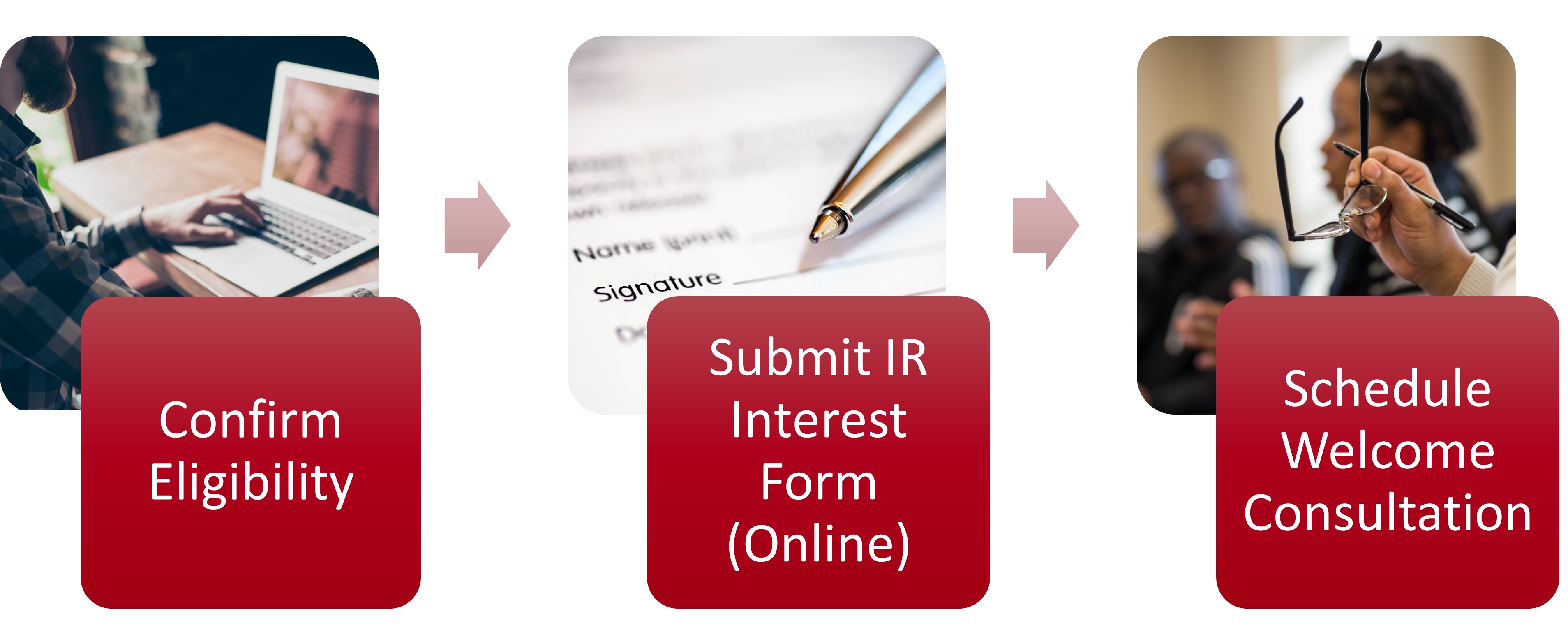Instructional Redesign
 To recognize, enhance, and reward university-wide excellence in teaching, the Drake Institute’s Instructional Redesign (IR) Program provides incentive-based support for the planning, implementation, and assessment of evidence-based teaching practices at Ohio State. This program equips Ohio State instructors with research-backed techniques and approaches to teaching designed to enhance learning and help position all students on a path to success.
To recognize, enhance, and reward university-wide excellence in teaching, the Drake Institute’s Instructional Redesign (IR) Program provides incentive-based support for the planning, implementation, and assessment of evidence-based teaching practices at Ohio State. This program equips Ohio State instructors with research-backed techniques and approaches to teaching designed to enhance learning and help position all students on a path to success.
About the Program
The IR Program has been carefully designed to achieve the following desired outcomes: 
- Increase the use of evidence-based practices across the university
- Engage instructors in assessing how instructional practices impact student learning and/or experience
- Encourage instructor reflection on instructional approaches
- Build a community around the pursuit of teaching excellence
Developed to support Ohio State full-time (0.75 FTE) non-student instructors in adopting and assessing the impact of evidence-based teaching practices, the Instructional Redesign Program (IR) provides a one-time incentive of $1,150 directly to participants upon successful completion of the program. Successful participants regain eligibility after five years.
Interested in IR at Ohio State? Start here!

1. Confirm Eligibility
All tenure-track, clinical, teaching and practice faculty and full-time lecturers (75% appointment or greater) who have completed the Teaching@OhioState Carmen course modules may participate in IR for compensation.
2. Submit IR Interest Form
Complete the IR Interest form using the “IR Interest Form” button below. This survey will ask for information about the course you are considering for instructional redesign and other details about your interest in the program.
3. Schedule Your IR Welcome Consultation
Request to schedule your IR Welcome Consultation with a Drake Institute staff member by e-mailing drakeinstitute@osu.edu with subject line "IR Consultation Request." This zoom-based, 30-minute conversation with a Drake Institute representative is intended to introduce you to the program, help you identify an appropriate program track, answer questions, and provide you with the documents, templates and resources necessary to complete the program efficiently and effectively.
Available IR Program Tracks
Program participants may select from three available program tracks.

The Retrospective Review Track is designed to recognize and acknowledge existing use and assessment of evidence-based teaching practices. Reviews are submitted in an IR Review Report.

The Planning New Instruction Track is designed to support detailed planning for implementation and assessment of new evidence-based teaching practices. Plans are submitted in an IR Plans Report.

The IR Portfolio Track is designed to fully support participants in implementing and assessing evidence-based instructional practices. Project results and findings are submitted in an IR Portfolio.
Which track is right for you?
The new Retrospective Review and Planning New Instruction tracks have been developed for participants seeking an accelerated program experience that can be completed during the term or, ideally, in advance of the start of the course. These tracks support the development of evidence-based instruction implementation and assessment plans, as well as the materials required for teaching. This process is designed to prepare each successful program particpant to deliver the redesigned instruction and assess its impact on student performance and/or experience.
Participants engaging in and successfully completing the IR Portfolio track will be supported throughout the planning, instructional implementation, and assessment stages of an IR project. This track provides participants with the most robust redesign experience and clear documentation of excellence in teaching through development of the IR Portfolio.
IR Plans and Portfolios are accepted on a rolling basis and are reviewed four times per year. Upcoming review deadlines are:
- October 2, 2023 (Monday)
- January 5, 2024 (Friday)
- April 1, 2024 (Monday)
- July 1, 2024 (Monday)
In a Hurry? Need an Idea? Consider an IR Recipe for your Project!
Intended for participants interested in Planning New Instruction or the IR Portfolio tracks, each IR Recipe provides a clear and succinct summary of a well-established evidence-based teaching strategy, as well as suggested approaches to measure the impact and effectiveness of the use of that strategy as a new element of your instruction. Simply determine three or more instances in which the strategy can be implemented in your course and use the steps outlined in an IR Recipe to quickly and easily develop your own plan for evidence-based instruction in your course.
Click a button below to download and review an IR Recipe of your choice! (Note: Transparency Recipe available early Au22)
Explore IR Success Stories
Hear about how IR impacted student learning and experience from previous instructional redesign participants. The Drake Institute showcases these and other outstanding IR portfolios on How Are You Teaching?.
| Nicholas Denton (Pharmacy Laboratory Instruction) | Joni Tornwall and Jodi McDaniel (peer feedback) |
|---|---|
IR Submission Information
For each IR Track, participants are required to submit materials for review and approval. Explore below to learn more about the expectations for each track.
Retrospective Review Track
- Intended to recognize participants who already implement known, evidence-based instructional strategies or approaches and who may, or may not, already assess and evaluate the impact of those practices.
- The IR Retrospective Review Report template is available for download. Links to relevant documents are included below. Requirements of this report include the following:
- Retrospective Implementation Plan
- A brief description of the areas of instruction that are supported by the reported practice(s).
- Outcomes for instruction and/or learning that are achieved through use of the practice(s).
- Resource citations (books, chapters, articles, workshops, trainings, etc.) to help others interested in learning more about the evidence-based practice(s) and to confirm the evidence-based nature of the practice(s).
- A detailed implementation plan (table) composed in a manner that would allow another instructor to adopt the practice(s) in their course/context.
- Retrospective Assessment Plan
- A llst of aligned data sources used to measure impact/effectiveness of the evidence-based instructional practice(s).
- An assessment plan (table) composed in a manner that details sources of data that are used to measure impact/effectiveness of the evidence-based practice(s), when and how those data are collected in the course, and how they are analyzed.
- Instructional Artifacts
- Uploads of course artifacts (assignments, lesson plans, summative assessments, assessment items, surveys) relevant to the project that serve to supplement the implementation and assessment plan tables.
- Reflection
- An independent reflection (prompted) by the participant on the IR experience and its impact on their instruction and expected impacts on student learning and experience.
Planning New Instruction Track
- Intended to support participants who seek to learn about and implement new, evidence-based instructional strategies.
The IR Planning New Instruction Report template is available for download. Requirements of this report include the following:
- Planning New Instruction Implementation Plan
- A brief description of the areas of instruction that are intended to be supported by the new instructional practice(s).
- Desired outcomes for instruction and/or learning that are predicted following implementation of the new practice(s).
- Resource citations (books, chapters, articles, workshops, trainings, etc.) to help others interested in learning more about the new evidence-based practice(s) and to confirm the evidence-based nature of those planned practice(s).
- A detailed implementation plan (table) composed in a manner that would allow another instructor to consider and potentially adopt the practice(s) in their course/context.
- Planning New Instruction Assessment Plan
- A list of aligned data sources to be used in the measurement of impact/effectiveness of the planned evidence-based instructional practice(s).
- An assessment plan (table) composed in a manner that details sources of data that will be used to measure impact/effectiveness of the evidence-based practice(s), when and how those data are to be collected in the course, and how they will be analyzed.
- Instructional Artifacts
- Uploads of course artifacts (new assignments, lesson plans, summative assessments, aligned assessment items, surveys) relevant to the project that serve to supplement the implementation and assessment plan tables.
- Reflection
- An independent reflection (prompted) by the participant on the IR experience and its impact on their anticipated instruction, as well as expected impacts on student learning and experience.
IR Portfolio Track
- Intended for participants who seek to fully document evidence of excellence in teaching through development of a portfolio that records implementation, assessment, and analysis of results of evidence-based instructional practice(s). .
The IR Portfolio Template is available for download. Requirements of the IR portfolio include the following:
- Course Context and Pedagogical Approaches section
- A brief description of the course and the the instructor's experience in teaching prior to IR.
- A list and/or description of the areas of instruction that are intended to be supported by the new instructional practice(s).
- Desired outcomes for instruction and/or learning that were predicted to result following implementation of the new practice(s).
- References and Resources section
- Resource citations (books, chapters, articles, workshops, trainings, etc.) to help others interested in learning more about the new evidence-based practice(s) and to confirm the evidence-based nature of those planned practice(s).
- A brief narrative describing how the participant engaged with resources and experiences in professional learning around teaching and how those resources and experiences worked to inform the changes made to instruction.
- Implementation Section
- Participants may elect to construct an implementation table documenting the changes to instruction that were implemented within the course and/or may elect to compose a narrative describing the changes made to instruction. This section should be created/written in a manner that could allow a reader to recreate the implementation in their own course/context.
- Assessment Section
- A list of the sources of data from the course that were used to measure impact and/or effectiveness of the changes to instruction and a brief juistification for how these measures align to the stated outcomes for the IR project (defined in IR Portfolio section 1).
- A brief narrative describing how and when the assessment data were collected and how they were analyzed (written in a manner that could allow a reader to replicate the process).
- An analysis of the data collected in the course (quantitative and/or qualitative)
- A summary of findings based upon the analysis conducted.
- A brief narrative describing how the findings aligned to the desired outcomes of the project and if the findings were in agreement with the predicted impacts on student performance and/or experience.
- Uploads of course artifacts (new assignments, lesson plans, summative assessments, aligned assessment items, surveys) relevant to the project that serve to supplement the implementation and assessment sections.
- Reflection
- an independent reflection (prompted) by the participant on the IR experience and its impact on their current and future instruction
Submission Process
Please submit the IR report or portfolio as an email attachment and send to drakeinstitute@osu.edu. The name of the file should including your last name, type of submission and submission period. (Example: sovic_irportfolio_July22)
IR reports and portfolios will be evaluated by a team of Drake Institute staff and faculty peers using a rubric with a specified list of criteria. Portfolios are accepted on a rolling basis.
Additional Resources
Anyone interested in learning more about the Instructional Redesign Program or evidence-based teaching practices should contact the institute at drakeinstitute@osu.edu to schedule a consultation with one of our instructional consultants or instructional redesign staff or to request information about any of the resources for redesign available from the institute. A selection of these resources are noted below.
- Instructional Redesign Asynchronous Short Courses
- Active Learning in Large Lectures
- Student Peer Review
- Team-Based Learning
- Instructional Redesign "Recipes"
- Peer Instruction Model
- Transparency in Teaching and Learning Framework
- Jigsaw Strategy
- One-Minute Paper and Other Classroom Assessment Techniques (CATs)
- Instructional Redesign Autumn and Spring Working Groups
